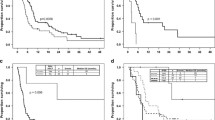Abstract
Twenty-eight of 285 patients (9.8%) with primary myelodysplastic syndrome (MDS) survived more than 5 yr (long-term survivors). There were 21 females and 7 males, median age 60 yr (range 18–84 yr). None had circulating blasts, and 14 had refractory anemia (RA), 8 RA with ringed sideroblasts (RARS) and 6 RA with excess of blasts (RAEB). Thirty-seven percent of the 27 patients who were karyotyped had an abnormal clone, but none of them had −7/7q- or complex cytogenetic abnormalities. Only one of the 13 patients tested had abnormal (i.e., “leukemic”) in vitro growth of GM progenitors. During 5 yr following the diagnosis, none of the 28 patients progressed to AML. Two patients with an initial diagnosis of RA showed progression to RAEB and CMML. After 5 yr, 23 of the 28 long-term survivors had stable disease (follow-up period ranged from 64 to 216 mo). One patient progressed to AML (113 mo after diagnosis) and another to RAEBT (80 mo after diagnosis). Eight asymptomatic patients were not treated and 12 patients received only supportive therapy. Except for 6 of 8 treated patients who responded to low-dose Ara-C, danazol, androgens, or immunosupressive treatment, prolonged survival seemed to result mainly from the natural course of the disease. Except for Valensia score (p=0.033), other scoring systems (Bournemouth, Dusseldorf, Lille, and IPSS score) proved of relatively limited value in differentiating between intermediate (2–5 yr) and long-term survivors.
Similar content being viewed by others
References
Bennett J, et al. Proposals for the classification of the myelodysplastic syndromes. Br J Haematol 1982; 51:189–199.
Mufti GJ, Stevens JR, Oscier DG, Hamblin TJ, Machin D. Myelodysplastic syndromes: a scoring system with prognostic significance. Br J Haematol 1985; 59:425–433.
Tricot G, De Wolf-Peeters C, Vlietinck R, Verwilghen L. Bone marrow histology in the myelodysplastic syndromes. II. Prognostic value of abnormal localization of precursors in MDS. Br J Haematol 1984; 58:217–225.
Sanz G, et al. Two regression models and a scoring system for predicting survival and planning treatment in myelodysplastic syndromes: a multivariate analysis of prognostic factors in 370 patients. Blood 1989; 74:395–408.
Aul C, et al. Primary myelodysplastic syndromes (MDS): analysis of prognostic factors in 235 patients and proposals for an improved scoring system. Leukemia 1992; 6:52–59.
Morel P, et al. Cytogenetic analysis has a strong independent prognostic value in de novo myelodysplastic syndromes and can be incorporated in a new scoring system: a report on 408 cases. Leukemia 1993; 7:1315–1323.
Greenberg P, et al. International scoring system for evaluating prognosis in myelodysplastic syndromes. Blood 1997; 89:2079–2088.
Mangi M, Mufti G. Primary myelodysplastic syndromes: diagnostic and prognostic significance of immunohistochemical assessment of bone marrow biopsies. Blood 1992; 79:198–205.
Maschek H, Gutzmer R, Choritz H, Georgii A. Life expectancy in primary myelodysplastic syndromes (pMDS): A prognostic score based upon histopathology from bone marrow biopsies of 569 patients. Eur J Haematol 1994; 53:280–287.
Goasguen J, et al. Prognostic factors of myelodysplastic syndromes—a simplified 3-D scoring system. Leuk Res 1990; 14:255–262.
Raymakers R, Preijers F, Boezeman J, Rutten E, De Witte T. Prognostic implications of bone marrow culturing in myelodysplastic syndrome: a retrospective analysis. Leuk Lymphoma 1993; 14:111–120.
Worsley A, et al. Prognostic features of chronic myelomonocytic leukaemia: a modified Bournemouth score gives the best prediction of survival. Br J Haematol 1988; 68:17–21.
Boogaerts M, Verhoef G, Demuynck H. Treatment and prognostic factors in myelodysplastic syndromes. Bailliere,s Clinical Haematology 1996; 9(1):161–183.
Yoshida Y, Oguma S, Uchino H, Maekawa T, Nomura T. Clinical features of long-term survivors of refractory myelodysplastic anemias. A Japanese cooperative study. Leuk Res 1992, 8:775–779.
Wattel E, et al. Long term survivors in myelodysplastic syndromes: a report on 63 cases and comparison with short and intermediate survivors. Leuk Res 1993; 17(9):733–739.
Reizenstein P, Ost A. Minimal diagnostic criteria for the myelodysplastic syndrome in clinical practice. Leuk Res 1992; 16(1):3–11.
Novak A, Kruškić M, Ludoški M, Jurkovski V. Rapid method for obtaining high quality chromosome banding in the study of hemopoietic neoplasia. Cancer Genet Cytogenet 1994; 74(6):109–114.
ISCN. In: Felix Mitelman (ed.). An International System for Human Genetic Nomenclature. Karger: Basel, 1995.
Kaplan EL, Meier P. Nonparametric estimation from incomplete observations. J Am Stat Assoc 1958; 53:457.
Marisavljević D, et al. Biological and clinical significance of clonogenic assays in patients with myelodysplastic syndromes. Med Oncol 2002; 19(4):249–259.
Marisavljević D, Bošković D. Spontaneous remission in myelodysplastic syndromes: incidence and patient,s characteristics. Fifth International Symposium on Myelodysplastic Syndromes. Prague, Czech Republic, 21–24 April 1999. Leuk Res 1999; 23(suppl 1):Abs. No. 82.
Author information
Authors and Affiliations
Corresponding author
Rights and permissions
About this article
Cite this article
Marisavljević, D., Rolović, Z., Bošković, D. et al. Long-term survivors in myelodysplastic syndromes. Med Oncol 21, 333–338 (2004). https://doi.org/10.1385/MO:21:4:333
Received:
Accepted:
Issue Date:
DOI: https://doi.org/10.1385/MO:21:4:333




